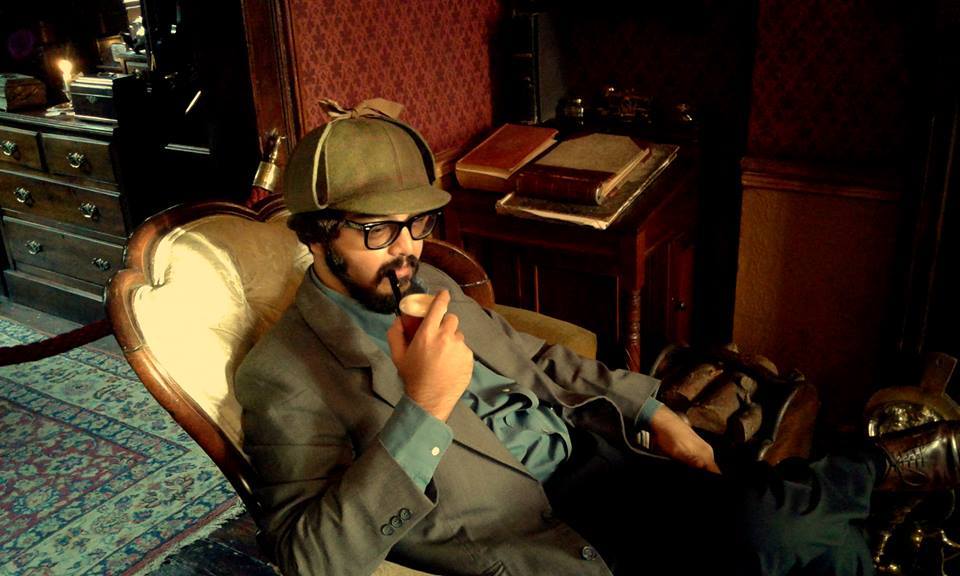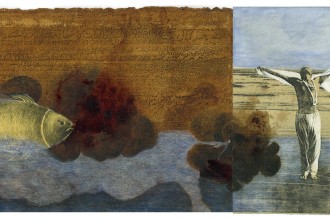Poet, academic, editor, groundbreaking thinker — Arup K Chatterjee is a dynamic and apparently indefatigable writer, and his work manages to be both radically new and closely connected to a number of ‘influential predecessors’. In an extended Poet of the Month interview, he tells Rosario Freire why space is ‘the quintessence of [his] writing’, what epigraphs and intertexuality add to his work, and why ‘any kind of acceptance of hegemony is counterproductive to writing.’
It seems that physical space plays an important role in your poetry, especially urban space—as in ‘On a December Noon’ and other poems like ‘Pocketwatch’, based in London, or ‘Speech’, based in Calcutta/Bangalore. Why is this? What role do these spaces play in your own life? If you had to choose a city to place ‘On a December Noon’ in, what would it be (or is there a city already)?  Is the location of that poem deliberately left unstated?
It is true that space is the quintessence of my writing. I am a self-compelled exile, when it comes to writing (ab)out spaces, which are in fact the spaces I myself inhabit. The urban space, the city-space and the very concept of spatiality play an important role in all I conceive as writing. I tend to choose spaces as characters, not in the hegemonic sense of the expression: “whether space is character in such and such a novel,†but in a more eclectic and realist sense, as if to imbue spaces with the idiosyncrasies of human creatures. Space in my conception is always anthropomorphic. This is not to say that the poor little creature called space—which cannot speak for itself or represent itself—should be, or can justifiably be, seen in human terms. But it must certainly be allowed to exist, and be related to, in degrees of human alternations, such as moodiness, hysteria, iconoclasm, surrealism, temper, good skin, bad skin, fair skin, dark skin, even skin rashes if you will, and much more. This, for me, is a serious challenge. Architects understand the skins of buildings, as a painter understands the patina. The writer also must have some such responsibility. You might easily conjecture I am referring unconsciously to Kafka or Márquez; or, to the Dickensian squalor of the industrial revolution’s London. I am, but I also am not, in the sense that all these writers did eventually refer to grand epochs of history. I do not have the sense or precociousness to foresee an epochal turn. Like Proust I tend to get lost in the extraordinarily quotidian aspects, which in my case are nearly always the facets of natural or human landscapes, or architectures of human mobility.
In my poem ‘Karvat,’ I used the landscape of the Hoe in Plymouth—its local pub culture and fish and chips outlets—to create an Oriental narrative based on Sufi symbols, somewhat resembling a romantic exchange which might have occurred in Delhi or Lucknow in another time. It was necessitated by my own need to live in that space which I tried to construct to the best of my ability. Without the creation of this mental landscape I would be in the throes of a severe exile.
To me space is necessarily urban, for there is a technique, after all, both in the pastoral-rural and the urban with which we build the heim (home). That inhabitable space, leading to the congregation of the merchants and vendors, to the agora, is therefore always tending towards the urban, at least in a philosophical sense, and certainly for literary purposes. These spaces, where my writings supposedly reside, are also my dwelling places. Whenever I encounter the unheimlich (the haunted home) I tend to build a new heim, therefore a new literary space. Needless to say a writer, in pursuit of characters, must be a good observer. In my case, wherever I fail to engage in a meaningful conversation with people I try to compensate by having one with spaces, which have in turn been built, trodden upon, nurtured, or neglected by generations of cacophonies of hundreds of voices.
‘On a December Noon,’ as hinted in the epigraph, is intended to abide in a heim shared with another great vocalist of space—Boris Pasternak. Being about exile, in many ways, ‘On a December Noon,’ is about Stalingrad (or what it might have been), a city I’ve never visited, and my study table where most of my flânerie occurs. The formal model for the street and the architecture is a street in London’s Baker Street where I spent some hours reading from, and decoding, the nighttime representation of places in the vicinity in ‘The Adventures of Sherlock Holmes’. It is also about Delhi, which does receive very cold winters, if not snows. And, finally it is about going upwards in(to) a coffin rather than being buried down, as is oftentimes the custom.
What inspired ‘On a December Noon’ and what inspires your poetry in general? How often do you use your own experiences—things you heard, or saw, or read?
It was inspired by ‘Doctor Zhivago’. It was also part of a dialogue that I have begun with voices that articulate melancholy, the voices of Pasternak, Eliot, Hardy, Lawrence, Gray, going back to a host of other graveyard poets of the eighteenth century.
Most of my writing works on a principle of reality which is ironically based entirely on previously written fiction or poetry. My writing can only be in response to writing. Often I even suspect I am only rewriting what others have written before me. There could be many ways to justify any singular or generic act of writing, and one very useful justification—although I disavow any utilitarian purport in writing—is that it creates new turns in language, in discourse, in sensibilities. Today ‘sensibility’, in the more complex understanding, refers to taste or aesthetics. Samuel Johnson however defined the word as ‘sensitivity,’ which certainly takes this to a level of rationality and enlightenment. I believe enlightenment cannot be restricted to any particular age, or icon such as the Buddha, or claimed to have been complete in the eighteenth century. And since it must go on, I must also go on writing despite rewriting, in a new language each time I write. In this regard, the reality principle is very crucial, since what is read or heard on the streets—as I have realized more so of late—very often seems absolutely unreal. The utter irrationality of quotidian lives—idleness or unemployment which breed magical realist autobiographies that were never written down—in all that we speak which when taken out of context has begun sounding more and more anomic, technologized, immutable in that it does not lend itself poetically to be borrowed, literarily transubstantiated, or even plagiarized, because most of it is so immediate. Voices overheard or radio voices, voices I read or listen to reading occasionally on the radio or upon a stage are so divorced from that rather benevolent pretension of universality. Writing and speech are no longer afraid to be rigidly bound by immediate landscapes and contexts. This is as irritating as it is challenging for a writer: to glean from the spoken and the written word that has come before my own requires great consistency of the reality principle. So, yes, while things may be really happening and be spoken and be enacted in real lives, their ring of truth is certainly lesser now in the written space, and while I am given entirely to engraving real life imagery and speech into my writing, upon the cartilage of literary traditions, I must now pay all the more attention to the shrinkage that the universal contexts of our articulations have globally undergone.
Most of your poems employ epigraphs and/or quotations from other poems —could you give a sense of what this intertextuality adds to your writing? Do the quotations usually inspire your own poem, or are they chosen once the poem has already been written?
The answer to the second part is simpler: sometimes the quotations are chosen prior to the completion of the poem, and sometimes much later.
I would like to say three things regarding the use of epigraphs in my poetry. Firstly, I hope to inspire, someday, some vision of pedagogic value in my writing. This is so because the epigraphs are primarily portraits or frames which bind the poems underneath them. Every poem is written like a picture composition, a very common nineteenth century practice, as well as a now-depleting pedagogical resource. I like deploying a sort of roman à clef wherein I try to both conceal and reveal—in short encode the principle of reality—in the epigraphs I choose. I have always enjoyed and heard of people doing the same while reading literature that makes the use of a key. The trick is to alienate the persona enough so as to not allow even the most familiar reader to locate identities of people or spaces from within the context of the poem. Else, the writing is reduced to a meretricious cipher. The epigraph however will always lead back to something very intimate which can unfold—for the psychoanalyst for instance—the entire sequence and plot of events on which the given poem is based.
The most singular reason I can cite for these epigraphs is one that comes from my academic sensibility. As an academic I am very attracted to the use of epigraphs in esoteric essays which practically no one reads. Somehow it adds a lot of aesthetic value to the appearance of the text of the essay. On a more serious note, the academic essay has the provision of footnotes, endnotes, in-text citations and so on. The poet has none of those privileges. Rather, the poet is deemed to be free. Even if he wants to refer to another writer he is condemned to not be able to cite. The epigraphs are part of my own technique of poetic citation.
Often I discover such irrevocably magnificent lines—sound-images, prepositions, adjectival nouns—in poetry which I cannot help but reproduce almost in entirety. In my poem ‘Al-Hijr’ I wrote the following lines:
Where do I go with such visions of the rails
which the philandering rail hardly comprehends—
soiled, dismembered, remembered compartments
The sounds and the nostalgic dilettantism of the love-object were directly drawn from Eliot’s “You had such a vision of the street/As the street hardly understands,†in ‘Preludes’. The very first stanza of ‘Al-Hijr’ bore the line “La lune ne garde aucune rancune—,†which was also meant to draw attention to Eliot. As regards the epigraph of the same poem, which is from Philip Larkin’s ‘An Arundel Tomb’ the lines “On a rain-littered platform they arrive/endlessly altered from a long ziyaarat/ from a desert mazaar or Arundel tomb†are once again very directly meant to resonate with Larkin’s “Light/ Each summer thronged the glass. A bright/ Litter of birdcalls strewed the same/ Bone-riddled ground. And up the paths/ The endless altered people came, Washing at their identity.†Such lines create such indelible impressions on my mind that their strong visual impact commands from me a poetic citation. Eliot’s “I am moved by fancies that are curled/ Around these images, and cling:/ The notion of some infinitely gentle/ Infinitely suffering thing†also had a similar effect and I used it as an epigraph to my poem ‘Karvat.’





